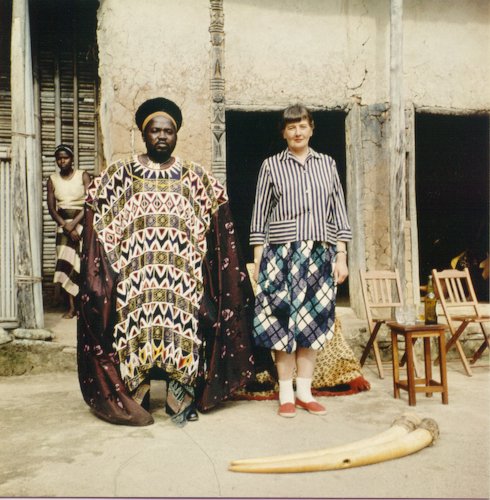

This project represents a remarkable coalescence of markedly divergent visions. Sally Chilver was born the year that the Great War in Europe began. One year on, in 1915, the German colonial occupation of Kamerun was brought to an end and the 'Kamerun' state effectively partitioned and separately administered by British and French colonial administrations for almost half a century prior to independence. Shortly on, in 1918, an especially virulent strain of influenza swept the globe leaving further millions dead in its wake.
The region of West-central Africa, the Cameroon Grassfields, that Sally Chilver was later to bring to world scholarly attention was untouched by neither war nor disease. In 1918 the influenza pandemic left its morbid imprint on the Grassfields where both the local population and the young and inexperienced British colonial administration were seriously depleted. These historical antecedents underlie the conditions and complexity of Grassfields culture and society which, in turn, have been the on-going forensic focus of the keen ethnographic and historical gaze of Sally Chilver over much of this century.
Sally Chilver's work in and on the Grassfields of Cameroon is inextricably tied in with that of her late colleague and close friend, the renowned anthropologist, Phyllis Kaberry. Sally, herself, brought, what was at the time, an innovative and broad historical methodology and perspective to the investigation of the ethnography of the Grassfields. In both their collaborative efforts and in Sally Chilver's and later reworking and recensions of their fieldnotes and in her ongoing correspondence with local informants we see an emergent 'anthropology' which retains greater currency today than the more methodologically narrow functionalism of the time. This methodologically broad approach to the Grassfields explicitly included the views of explorers, missionaries and colonial administrators such voices which were more usually eschewed in contemporary functionalist anthropology. These materials and voices are repeated here in these pages.
While methodologically Sally Chilver was ahead of her time there are also theoretical implications which arise from that methodology which have particular and apposite resonance with our own recent concerns with issues to do with identity and ethnicity. Exploratory, missiological and colonial administrative (and ethnographic!) writings all bear directly on these issues. And the bearing these things have goes beyond simply recording observations of existing conditions. Enquiry itself may in part be generative of the states it seeks to uncover. Sally Chilver's meticulous and ongoing enquiry into the ethnography of the wider Grassfields is reproduced here in microcosm in the form of her 'Working Notes on the Bum' which exemplifies both the quality and depth of that enquiry as well as the breadth and systematicity of her methodology.
In this project I have sought to marry up Sally Chilver's particular historical and ethnographic vision with an equally, albeit technologically, innovative approach to the representation and delivery of these scholarly materials. I refer to Mike Fischer's work on computing and anthropology at the University of Kent and the development of the ERA project of which this project forms one element. That work, supported by David Zeitlyn and Alan Bicker, derives from an extraordinarily innovative approach to the use of Information Technology, electronic communications and multimedia in representing ethnography and anthropological ideas.
Hence I wish to acknowledge my deep gratitude to Mike Fischer and Sally Chilver for giving me this opportunity to marry up their extraordinary visions of what anthropology is and what anthropology might be. I wish to pay particular thanks to Sally Chilver both for her great courage in allowing her material to be used in this way and also for her time and patience in assisting, explaining and, with her usual good heart, generally jollying things along.
Ian Fowler
South Stoke
July 1998
| Aims of the Project | How to use these pages | Contents |
| Sally Chilver's Field Diary | Phyllis Kaberry Fieldnotes | Published Account |
For further information contact Ian Fowler